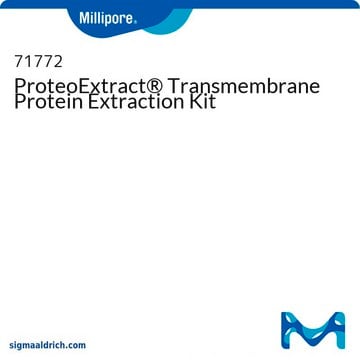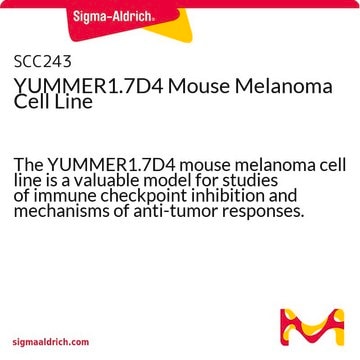SCC420
B16-OVA MO4 Mouse Melanoma Cell Line
Mouse
Szinonimák:
B16-OVA MO4 Cell Line, Melanoma Cell Line, Mouse Melanoma Cells
Bejelentkezésa Szervezeti és Szerződéses árazás megtekintéséhez
Összes fotó(3)
About This Item
UNSPSC kód:
41106514
NACRES:
NA.71
biológiai forrás:
mouse
növekedési mód:
N/A
gyártó/kereskedő neve:
Millipore
Javasolt termékek
Terméknév
B16-OVA MO4 Mouse Melanoma Cell Line,
biológiai forrás
mouse
kiszerelés
vial of >1X10⁶ cells
gyártó/kereskedő neve
Millipore
növekedési mód
N/A
technika/technikák
cell culture | mammalian: suitable
kiszállítva
dry ice
tárolási hőmérséklet
−196°C
Általános leírás
The immune system can recognize and destroy tumors. Cytotoxic T lymphocytes (CTLs) kill neoplastic (or virally infected) cells after recognizing antigenic peptides bound to major histocompatibility complex (MHC) class I molecules on their surface. These peptides are derived from antigens that are degraded in the cytosol of the affected cell. Immunizations with killedpathogens or their proteins do not generally elicit CTLs, because exogenous proteins cannot enter the cytosol (to bepresented). However, antigens that are internalized into phagocytic cells can enter the cytosol and be processed for classI presentation. Immunization with a purified antigen attached to an avidly phagocytized particle primes CTLs, which in turnprotect animals from subsequent challenge with tumors transfected with the antigen gene.
Alkalmazás
- Each vial contains >1X106 viable cells.
- Cells are tested negative for infectious diseases by a Mouse Essential CLEAR panel by Charles River Animal Diagnostic Services.
Cells are verified to be of mouse origin and negative for inter-species contamination from rat, Chinese hamster, Golden Syrian hamster, human and non-human primate (NHP) as assessed by a Contamination CLEAR panel by Charles River Animal Diagnostic Services.
- Cells are negative for mycoplasma contamination.
Background
The immune system can recognize and destroy tumors. Cytotoxic T lymphocytes (CTLs) kill neoplastic or virally infected cells after recognizing antigenic peptides bound to major histocompatibility complex class I molecules on their surface. These peptides are derived from antigens that are degraded in the cytosol of the affected cell. Immunizations with killed pathogens or their proteins do not generally elicit CTLs, because exogenous proteins cannot enter the cytosol (to be presented). However, antigens that are internalized into phagocytic cells can enter the cytosol and be processed for class I presentation. Immunization with a purified antigen attached to an avidly phagocytized particle primes CTLs, which in turn protect animals from subsequent challenge with tumors transfected with the antigen gene.1
Source
Tumor rejection antigens – TRAs – differ from any other protein synthesized by the cell in that the host is intolerant to them. Thus virtually any foreign protein synthesized by a tumor, including those expressed from foreign antigen genes transfected into tumor cells, should function and behave like TRAs. This hypothesis was tested in a murine tumor model developed by transfecting the chicken ovalbumin gene into the C57BL/6 (H-2b haplotype)-derived murine melanoma cell line B16, followed by selection and isolation of the ovalbumin (OVA)-transfected B16 clone B16-OVA MO4.1
In in vitro challenge, B16-OVA MO4 cells stimulated the OVA+ Kb-specific T-cell hybridoma RF33.70 to produce interleukin-2 whereas untransfected B16 cells did not. Injected intradermally into syngeneic C57Bl/6 mice, both B16 and B16-OVA MO4 grew progressively, metastasized, and killed the animals showing that expression of the ovalbumin antigen alone does not render this tumor sufficiently immunogenic to be rejected. Subcutaneous immunization of C57Bl/6 mice with ovalbumin conjugated to iron beads (OVA-Fe), however, protected B16-OVA MO4 (but not B16) challenged animals both from local tumor growth and death. This approach could be exploited to develop tumor and viral vaccines.1
References
1. Falo LD Jr, Kovacsovics-Bankowski M, Thompson K, Rock KL. Nat. Med. 1995; 1(7):649-653.
2. Fidler IJ. Cancer Res. 1975; 35(1):218-224.
Note: Mouse xenotropic retrovirus Bxv-1 proviral DNA is detected in B16-OVA MO4 cells, BXV-1 is a Biosafety Level 2 (BSL-2) pathogen.
The immune system can recognize and destroy tumors. Cytotoxic T lymphocytes (CTLs) kill neoplastic or virally infected cells after recognizing antigenic peptides bound to major histocompatibility complex class I molecules on their surface. These peptides are derived from antigens that are degraded in the cytosol of the affected cell. Immunizations with killed pathogens or their proteins do not generally elicit CTLs, because exogenous proteins cannot enter the cytosol (to be presented). However, antigens that are internalized into phagocytic cells can enter the cytosol and be processed for class I presentation. Immunization with a purified antigen attached to an avidly phagocytized particle primes CTLs, which in turn protect animals from subsequent challenge with tumors transfected with the antigen gene.1
Source
Tumor rejection antigens – TRAs – differ from any other protein synthesized by the cell in that the host is intolerant to them. Thus virtually any foreign protein synthesized by a tumor, including those expressed from foreign antigen genes transfected into tumor cells, should function and behave like TRAs. This hypothesis was tested in a murine tumor model developed by transfecting the chicken ovalbumin gene into the C57BL/6 (H-2b haplotype)-derived murine melanoma cell line B16, followed by selection and isolation of the ovalbumin (OVA)-transfected B16 clone B16-OVA MO4.1
In in vitro challenge, B16-OVA MO4 cells stimulated the OVA+ Kb-specific T-cell hybridoma RF33.70 to produce interleukin-2 whereas untransfected B16 cells did not. Injected intradermally into syngeneic C57Bl/6 mice, both B16 and B16-OVA MO4 grew progressively, metastasized, and killed the animals showing that expression of the ovalbumin antigen alone does not render this tumor sufficiently immunogenic to be rejected. Subcutaneous immunization of C57Bl/6 mice with ovalbumin conjugated to iron beads (OVA-Fe), however, protected B16-OVA MO4 (but not B16) challenged animals both from local tumor growth and death. This approach could be exploited to develop tumor and viral vaccines.1
References
1. Falo LD Jr, Kovacsovics-Bankowski M, Thompson K, Rock KL. Nat. Med. 1995; 1(7):649-653.
2. Fidler IJ. Cancer Res. 1975; 35(1):218-224.
Note: Mouse xenotropic retrovirus Bxv-1 proviral DNA is detected in B16-OVA MO4 cells, BXV-1 is a Biosafety Level 2 (BSL-2) pathogen.
Tulajdonságok és előnyök
B16-OVA MO4 cell line is a model for cancer immunotherapy, expressing ovalbumin (OVA) in order to facilitate strong immune responses to tumor antigens.
Tárolás és stabilitás
Cells should be stored in liquid nitrogen until use. The cells can be cultured for at least 10 passages after initial thawing without significantly affecting the cell marker expression and functionality.
Egyéb megjegyzések
This product is intended for sale and sold solely to academic institutions for internal academic research use per the terms of the “Academic Use Agreement” as detailed in the product documentation.
Jogi nyilatkozat
Unless otherwise stated in our catalog or other company documentation accompanying the product(s), our products are intended for research use only and are not to be used for any other purpose, which includes but is not limited to, unauthorized commercial uses, in vitro diagnostic uses, ex vivo or in vivo therapeutic uses or any type of consumption or application to humans or animals.
Tárolási osztály kódja
10 - Combustible liquids
WGK
WGK 2
Lobbanási pont (F)
Not applicable
Lobbanási pont (C)
Not applicable
Analitikai tanúsítványok (COA)
Analitikai tanúsítványok (COA) keresése a termék sarzs-/tételszámának megadásával. A sarzs- és tételszámok a termék címkéjén találhatók, a „Lot” vagy „Batch” szavak után.
Már rendelkezik ezzel a termékkel?
Az Ön által nemrégiben megvásárolt termékekre vonatkozó dokumentumokat a Dokumentumtárban találja.
Tudóscsoportunk valamennyi kutatási területen rendelkezik tapasztalattal, beleértve az élettudományt, az anyagtudományt, a kémiai szintézist, a kromatográfiát, az analitikát és még sok más területet.
Lépjen kapcsolatba a szaktanácsadással







